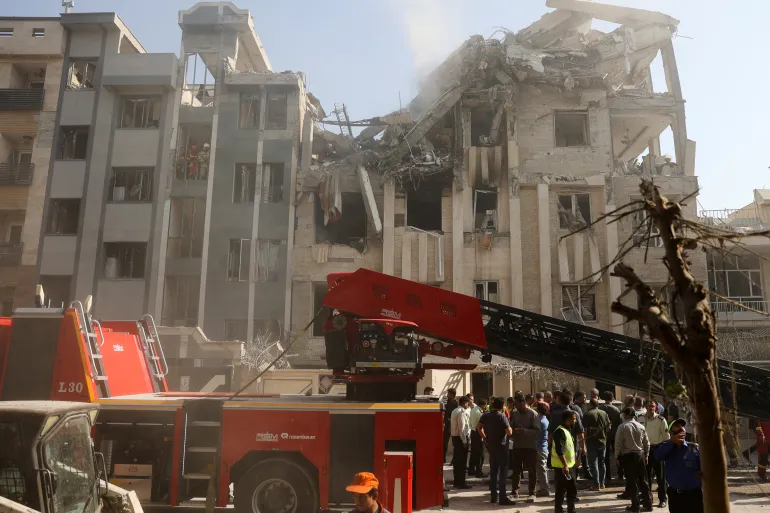The recent Israeli airstrike on Iranian territory has sent shockwaves across the Middle East and drawn global attention to the escalating tensions between the two archrivals. The precision attack, reportedly targeting key Iranian military assets, has reignited fears of a broader conflict in a region already marred by instability. This article explores the background of the conflict, reported casualties, and the far-reaching implications of the strike, while also examining what could happen next.
The Background
Tensions between Israel and Iran have simmered for decades, fueled by ideological opposition, geopolitical rivalry, and proxy warfare. Israel views Iran’s nuclear ambitions and support for militant groups such as Hezbollah, Hamas, and the Houthis as existential threats. Iran, on the other hand, sees Israel as a Western-backed occupier and a destabilizing force in the Muslim world.
The immediate trigger for this latest confrontation appears to be intelligence indicating that Iran was advancing its uranium enrichment activities beyond previously declared limits. Israeli officials also claimed Iran was planning coordinated attacks on Israeli targets through its proxy networks in Lebanon and Syria.
While both nations have exchanged indirect hostilities for years—especially through cyberattacks, espionage, and proxy militias—this direct Israeli strike on Iranian soil marks a dangerous new phase.
Casualty Figures

Initial reports suggest that at least 27 people were killed and more than 70 injured in the Israeli airstrike, which hit an Iranian military installation near the city of Isfahan, known for housing sensitive nuclear infrastructure.
Among the casualties were senior members of Iran’s Revolutionary Guard Corps (IRGC), several military technicians, and unfortunately, some civilians caught in nearby residential areas. Satellite imagery released by international observers confirms substantial structural damage, with smoke and debris still visible hours after the attack.
Iranian state media has condemned the attack, calling it an “act of war,” while Israel has neither confirmed nor denied responsibility—a common tactic in its covert operations.
What Are the Implications?
Regional Instability
This attack further destabilizes an already volatile Middle East. With Iran vowing revenge and its proxies on high alert, neighboring countries like Iraq, Lebanon, and Syria may soon be drawn into retaliatory skirmishes. The risk of miscalculation or full-scale conflict has increased dramatically.
Global Diplomatic Fallout
World powers have responded with deep concern. The United Nations has called for an emergency Security Council session. The U.S. has urged restraint, while Russia and China have condemned the strike, warning of “unpredictable consequences.” The European Union has called on both parties to return to diplomatic channels.
Economic Consequences
Global oil prices spiked by 7% within hours of the news breaking, as markets feared potential disruption to oil exports from the Gulf. The Iranian threat to close the Strait of Hormuz, a crucial waterway for global energy supplies, has added to the uncertainty.
Nuclear Escalation
Perhaps the most alarming consequence is the risk of nuclear escalation. Iran, already under heavy international scrutiny for its uranium enrichment activities, may now feel justified in withdrawing completely from the nuclear Non-Proliferation Treaty (NPT) and pursuing a weaponized program in response to what it sees as Israeli aggression.
What Is Happening Next?

Iran’s Response
Iran has vowed to retaliate “at a time and place of its choosing.” Intelligence sources suggest that Iran has placed missile units on high alert and may coordinate retaliatory strikes through Hezbollah in Lebanon or militias in Syria and Iraq.
Israel’s Preparations
Israel has activated its Iron Dome and David’s Sling missile defense systems across major cities and has called up reserve troops. Flights into Tel Aviv have been restricted, and emergency preparedness protocols are being reviewed nationwide.
Diplomatic Developments
Global actors are working frantically to de-escalate the crisis. Back-channel talks reportedly involving Qatar, Turkey, and Switzerland are underway to prevent an all-out war. The U.S. Secretary of State is expected to travel to both Jerusalem and Tehran for shuttle diplomacy.
Regional Reactions
Arab countries are walking a tightrope. Saudi Arabia and the UAE, wary of Iran’s aggression but cautious about open support for Israel, have called for “restraint and regional dialogue.” Turkey has urged all parties to avoid further military confrontation.
The Israeli bombing of Iran marks a pivotal moment in Middle Eastern geopolitics. While both nations have long engaged in shadow warfare, this overt act risks igniting a conflict with far-reaching regional and global consequences. The coming days will be crucial as the world watches to see whether diplomacy can once again pull both nations back from the brink—or whether the region is on the edge of a new and dangerous chapter in its history.

